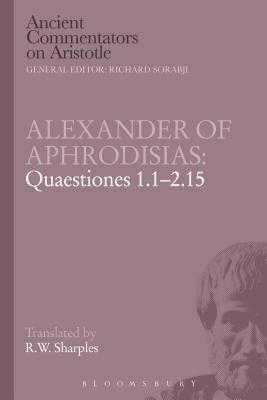
- We will send in 10–14 business days.
- Author: R W Sharples
- Publisher: Bloomsbury Publishing PLC
- ISBN-10: 1780934564
- ISBN-13: 9781780934563
- Format: 15.6 x 23.4 x 1 cm, softcover
- Language: English
- SAVE -10% with code: EXTRA
Reviews
Description
The Quaestiones attributed to Alexander of Aphrodisias, the leading ancient commentator on Aristotle, are concerned with physics and metaphysics, psychology and divine providence. They exemplify the process by which Aristotle's thought came to be organised into 'Aristotelianism', and show how interpretations were influenced by the doctrines of Hellenistic philosophy. Some of them, translated into Arabic and thence into Latin, played a part in the transmission of ancient Greek philosophy to the medieval world; and they are still of use today in the interpretation of Aristotle's views on such matters as the problem of universals and the relation between form and matter.
The Quaestiones have been studied more and more in recent years; but the present volume and its successor offer the first translation of the whole collection into English or any other modern language.
EXTRA 10 % discount with code: EXTRA
The promotion ends in 20d.02:58:25
The discount code is valid when purchasing from 10 €. Discounts do not stack.
- Author: R W Sharples
- Publisher: Bloomsbury Publishing PLC
- ISBN-10: 1780934564
- ISBN-13: 9781780934563
- Format: 15.6 x 23.4 x 1 cm, softcover
- Language: English English
The Quaestiones attributed to Alexander of Aphrodisias, the leading ancient commentator on Aristotle, are concerned with physics and metaphysics, psychology and divine providence. They exemplify the process by which Aristotle's thought came to be organised into 'Aristotelianism', and show how interpretations were influenced by the doctrines of Hellenistic philosophy. Some of them, translated into Arabic and thence into Latin, played a part in the transmission of ancient Greek philosophy to the medieval world; and they are still of use today in the interpretation of Aristotle's views on such matters as the problem of universals and the relation between form and matter.
The Quaestiones have been studied more and more in recent years; but the present volume and its successor offer the first translation of the whole collection into English or any other modern language.


Reviews